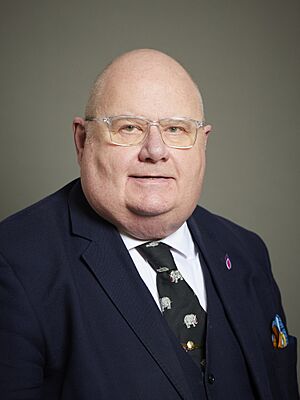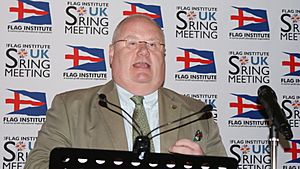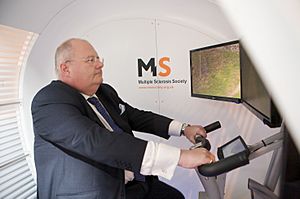Eric Pickles facts for kids
Quick facts for kids
The Lord Pickles
|
|
|---|---|

Official portrait, 2024
|
|
| United Kingdom Special Envoy for Post-Holocaust Issues | |
| Assumed office 10 September 2015 |
|
| Prime Minister | |
| Preceded by | Robert Andrew Burns |
| United Kingdom Anti-Corruption Champion | |
| In office 11 May 2015 – 11 December 2017 |
|
| Prime Minister |
|
| Preceded by | Matt Hancock |
| Succeeded by | John Penrose |
| Secretary of State for Communities and Local Government | |
| In office 12 May 2010 – 11 May 2015 |
|
| Prime Minister | David Cameron |
| Preceded by | John Denham |
| Succeeded by | Greg Clark |
| Minister of State for Faith | |
| In office 6 August 2014 – 11 May 2015 |
|
| Prime Minister | David Cameron |
| Preceded by | The Baroness Warsi |
| Succeeded by | The Lord Bourne of Aberystwyth |
| Chairman of the Conservative Party | |
| In office 19 January 2009 – 12 May 2010 |
|
| Leader | David Cameron |
| Preceded by | Caroline Spelman |
| Succeeded by |
|
| Member of the House of Lords | |
| Assumed life peerage 18 June 2018 |
|
| Member of Parliament for Brentwood and Ongar |
|
| In office 9 April 1992 – 3 May 2017 |
|
| Preceded by | Robert McCrindle |
| Succeeded by | Alex Burghart |
| Shadow Cabinet portfolios | |
| 2002 | Shadow Secretary of State for Local Government and the Regions |
| 2003–2005 | Shadow Secretary of State for Local Government |
| 2007–2009 | Shadow Secretary of State for Communities and Local Government |
| Personal details | |
| Born |
Eric Jack Pickles
20 April 1952 Keighley, England |
| Political party | Conservative |
| Spouse | Irene Coates |
| Alma mater | Leeds Metropolitan University |
| Website | |
Eric Jack Pickles, Baron Pickles, (born 20 April 1952) is a British politician for the Conservative Party. He was a Member of Parliament (MP) for the Brentwood and Ongar area from 1992 to 2017.
From 2010 to 2015, he was the Secretary of State for Communities and Local Government in David Cameron's government. During this time, a building called Grenfell Tower was renovated with unsafe materials. After a terrible fire at the tower in 2017, an inquiry criticised Lord Pickles for the rules that allowed this to happen. Some people called for him to leave his position in the House of Lords, but he did not.
Lord Pickles also served as Chairman of the Conservative Party from 2009 to 2010. In 2015, he was appointed as the UK's Special Envoy for Post-Holocaust Issues, a role he continues to hold. He is also the chairman of a group called Conservative Friends of Israel in the House of Lords.
Contents
Early Life and Education
Eric Jack Pickles was born on 20 April 1952 in Keighley, England. His parents were Jack and Constance Pickles. He went to Greenhead Grammar School and later studied at Leeds Polytechnic.
His family supported the Labour Party. His great-grandfather even helped start the Independent Labour Party. As a boy, Lord Pickles said he was very interested in communism.
Joining the Young Conservatives
In 1968, the Soviet Union invaded Czechoslovakia. This event shocked Lord Pickles and led him to join the Young Conservatives, the youth group of the Conservative Party. He said, "I was so shocked by the tanks... it made me feel better."
He soon became the chairman of his local Young Conservatives group. He was also part of a group called the Joint Committee Against Racism from 1982 to 1987.
Career as a Bradford Councillor
In 1979, Lord Pickles was elected to the Bradford Council. A city council is a group of people elected to make decisions for a local area. From 1988 to 1990, he was the leader of the Conservative group on the council.
In 1988, the Conservative Party took control of the council. Lord Pickles announced a plan to cut the council's spending by £50 million and make many services private. These changes were controversial at the time.
Career in Parliament
In 1992, Lord Pickles was elected as the Member of Parliament (MP) for Brentwood and Ongar. An MP's job is to represent the people of their local area, called a constituency, in the House of Commons.
Shadow Cabinet Roles
Between 2001 and 2009, Lord Pickles held several important jobs in the Shadow Cabinet. The Shadow Cabinet is a team of politicians from the main opposition party. Their job is to challenge the government and present alternative ideas.
In 2007, he became the Shadow Secretary of State for Communities and Local Government. In this role, he announced plans to lower the high salaries of some council leaders.
Chairman of the Conservative Party
After managing a successful election campaign in 2008, Lord Pickles was promoted to Chairman of the Conservative Party in 2009. He held this position until 2010.
In early 2010, he defended the UK's "first-past-the-post" voting system. This is a system where the candidate with the most votes in each area wins. He argued that it helps create stable governments.
Secretary of State for Communities and Local Government
When the Conservative Party formed a government in 2010, Prime Minister David Cameron made Lord Pickles the Secretary of State for Communities and Local Government. This is a senior government minister in charge of local government, housing, and communities in England.
Changes to Local Government
Lord Pickles wanted to give local people more power. He introduced a plan that would let residents vote on whether their council could raise council tax. Council tax is a fee people pay to their local council for services like rubbish collection and parks.
In 2010, he also announced the closure of the Audit Commission. This organisation checked how councils spent their money. Some people worried that without the commission, it would be harder to spot financial problems in local councils.
The Localism Act 2011
Lord Pickles was in charge of the Localism Act 2011. This law was designed to give local communities more control over decisions in their area, especially in housing and planning.
However, some people felt the law did not go far enough. For example, soon after the law was announced, Lord Pickles approved the building of a large gas plant near a village in Gloucestershire, even though many local people and councils were against it.
Council Prayers
In 2012, a court ruled that it was not lawful for councils to hold official prayers as part of their formal meetings. Lord Pickles disagreed with this decision. He used the new Localism Act to state that councils had the power to do anything a person could do, which he said included praying.
In 2015, a new law, the Local Government (Religious Observances) Act, officially allowed councils to hold prayers at the start of their meetings.
Troubled Families Programme
Lord Pickles led a government project called the Troubled Families Programme. It aimed to help around 120,000 families who were facing multiple problems. The government claimed the programme was a "triumph" and had saved the country a lot of money.
However, a later report by independent researchers found that the programme had "no significant impact." The Public Accounts Committee, a group of MPs who check government spending, also said the government's claims about the programme's success were misleading.
Life After Parliament
In April 2017, Lord Pickles announced he would not run for re-election as an MP. In 2018, he was given a Life Peerage, which means he became a member of the House of Lords for life. He is now known as Baron Pickles.
He has attended the Conservative Party's annual conference for over 50 years in a row.
Personal Life
Lord Pickles married Irene Coates in 1976.
Honours
- In 2010, Lord Pickles became a member of the Privy Council. This is a group of advisors to the monarch. Members can use the title "The Right Honourable".
- In 2015, he was made a Knight Bachelor, a special honour given by the monarch.
- In 2018, he was made a Life Peer and became Baron Pickles, of Brentwood and Ongar in the County of Essex.
 | Selma Burke |
 | Pauline Powell Burns |
 | Frederick J. Brown |
 | Robert Blackburn |



